Diabetes Diet: Top 20 Fruits for Diabetes
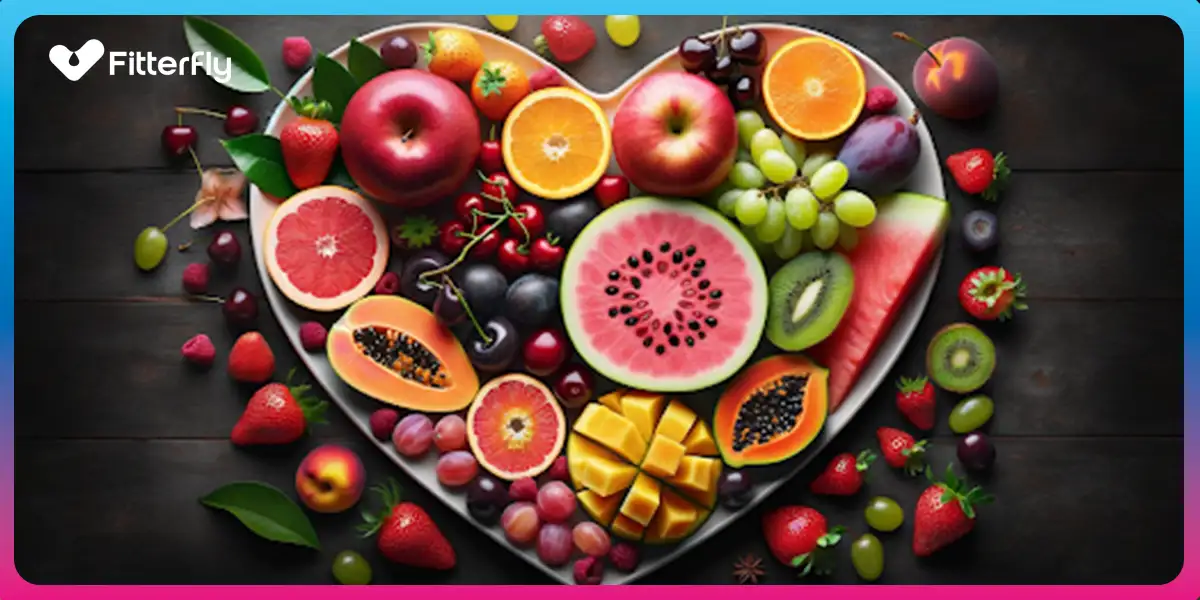
If you’ve ever consulted a dietician, one of the first things they recommend is that you eat smaller, more frequent meals instead of three heavy meals. This helps keep your blood sugar levels stable instead of big spikes and drops, which are detrimental to your health.
Snacking in between can be tricky for some people and is the easiest time to eat something unhealthy. One healthy and nutritious option is eating fruits.
Yes, you heard that right! In this article, you will discover diabetes-friendly fruits with low sugar that are best for people with diabetes.
Are Fruits Good for Diabetes? Understanding the Role of Glycemic Index
There are many misconceptions about diabetes and fruit consumption. It’s commonly thought that since people with diabetes need to reduce sugar intake, naturally sweet fruits should be avoided.
However, this is not entirely accurate. Fruits are loaded with essential nutrients, including vitamins, antioxidants, and anti-inflammatory compounds, making them a healthy snack option.
The Role of Fruits in a Diabetes Friendly Diet
Fruits can and should be a part of a diabetes-friendly diet, but it’s crucial to choose the right types and quantities. The key lies in understanding the Glycemic Index (GI) of fruits and how they can affect blood sugar levels.
Glycemic Index (GI): A Tool for Managing Diabetes
Glycemic Index (GI) is a scale that measures how quickly carbohydrate-containing foods raise blood sugar levels post-consumption. Foods with a high GI are digested and absorbed rapidly, leading to a quick increase in blood sugar.
To know your chances of Diabetes reversal, take the Diabetes Reversal TestDiabetes Reversal
Calculator
On the other hand, low-GI foods are absorbed more slowly, causing a gradual rise in blood sugar.
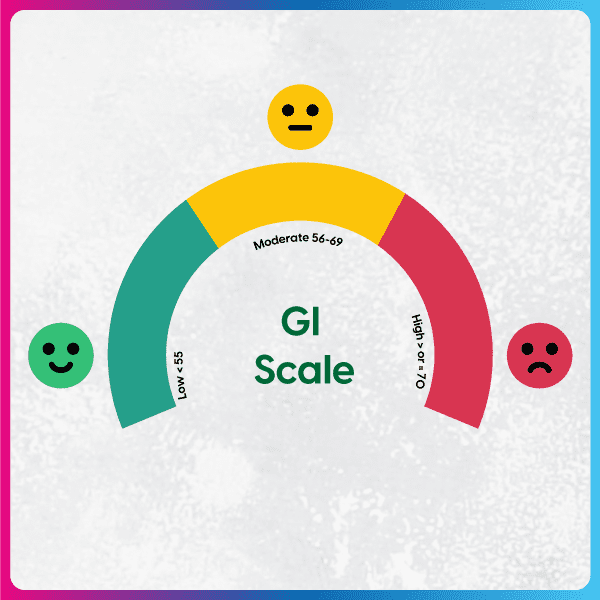
Selecting Diabetes-Friendly Fruits
For people with diabetes, selecting fruits with a low to moderate GI can help maintain stable blood sugar levels. These fruits release sugar into the bloodstream at a slower rate, aiding in better blood sugar control.
It’s essential, however, to balance fruit intake with other nutritional considerations like fiber, total sugar, and fat content.
Consultation and Personalized Dietary Planning
While the GI offers a useful framework, it’s just one aspect of managing diabetes. Comprehensive dietary planning and blood sugar management should always involve consultation with healthcare professionals.
List of Fruits for Diabetes
These diabetes-friendly fruits are both low in carbs and have a low glycemic index, making them suitable for your diabetes diet plan. Here’s a list of the top 20 fruits for diabetes that are low in sugar and can be eaten without worrying about your blood sugar levels spiking:
1. Apples
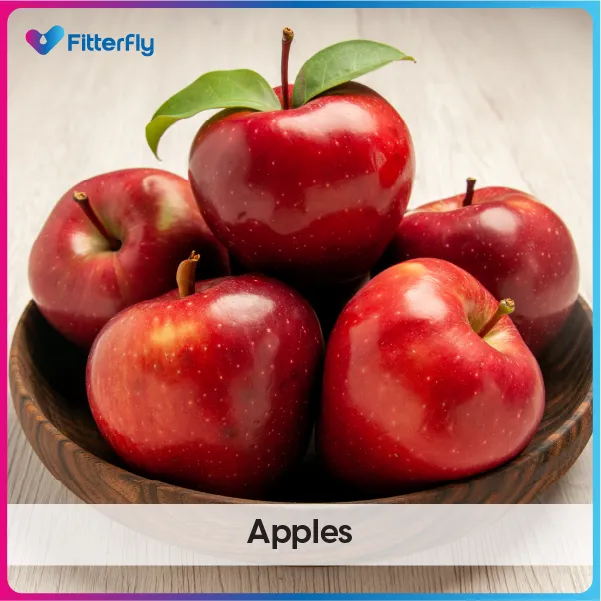

They weren’t bluffing when they said that an apple a day can keep the doctor away! Rich in both soluble and insoluble fibre, apples are excellent at preventing blood sugar fluctuations. Apples can be enjoyed as a quick snack or chopped into fruit salads.
2. Strawberries
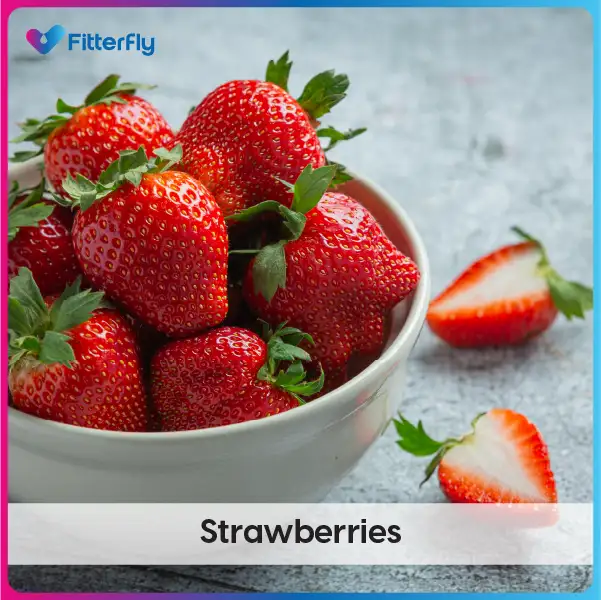

Strawberries, with their low glycemic index and high fiber content, are ideal for managing diabetes. They support weight loss efforts due to being low in calories and are rich in antioxidants, which boost overall health and immunity.
3. Oranges
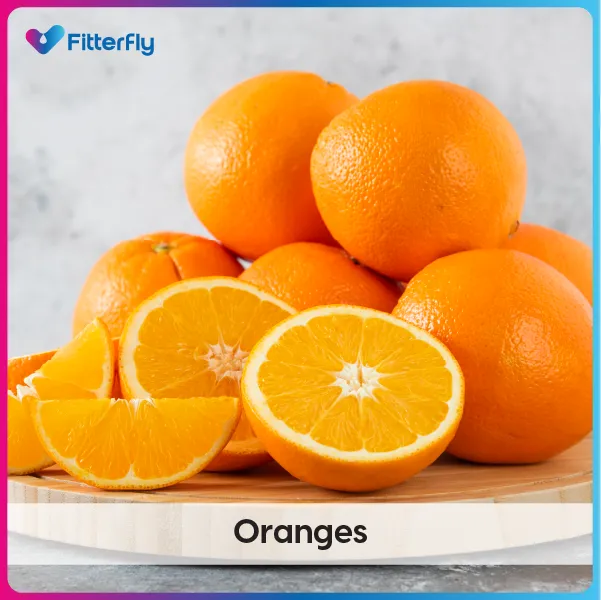

The American Diabetes Association (ADA) considers citrus fruits (oranges, grapefruits and lemons) to be diabetes superfoods. Oranges, in particular, are rich in Vitamin C, fibre, potassium, folates, flavonols, flavanones and phenolic acid, all of which are good for diabetes.
4. Cherries
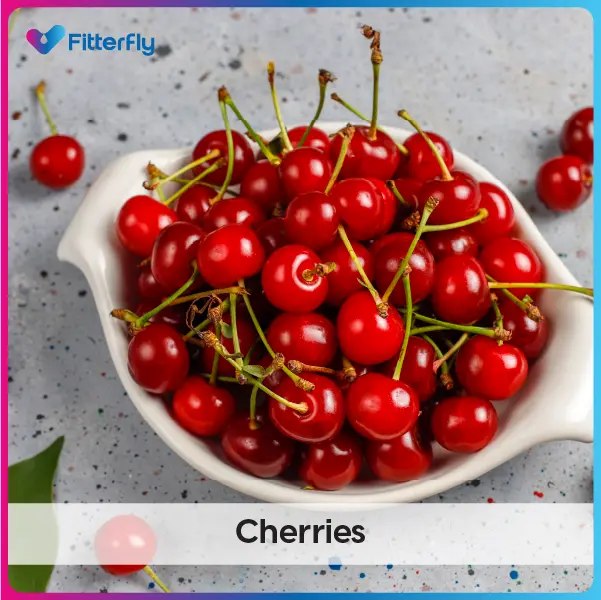

Cherries are excellent for blood sugar control due to their low glycemic index. They are also beneficial for weight loss, being low in calories. Rich in antioxidants, cherries help in reducing inflammation and improve heart health.
5. Black Jamuns
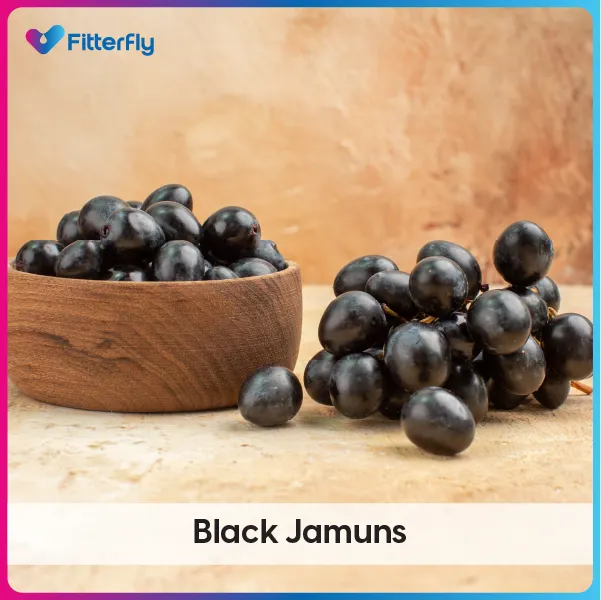

Black jamuns are fruits with low sugar and are undoubtedly the best fruit for diabetes! People even have the powdered seeds of this fruit to keep their blood sugar levels in check.
6. Starfruits
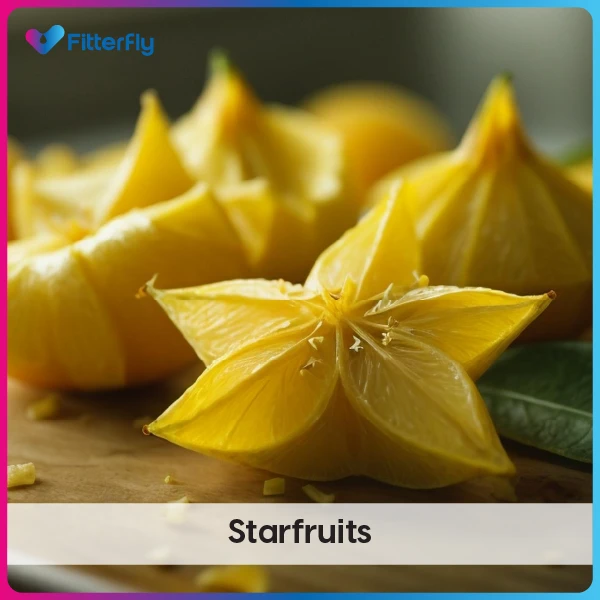

Starfruit, or Kamrakh, is low in calories, making it an excellent choice for those aiming to manage their weight. Rich in fiber, starfruit aids in digestion and promotes a feeling of fullness, which can help prevent overeating.
Its low glycemic index (GI) means it doesn’t cause rapid spikes in blood sugar levels, making it suitable for people with diabetes. Additionally, starfruit is packed with antioxidants and Vitamin C, which support overall health and immunity.
However, it should be consumed in moderation, especially by people with kidney problems, due to its high oxalate content.
7. Watermelons
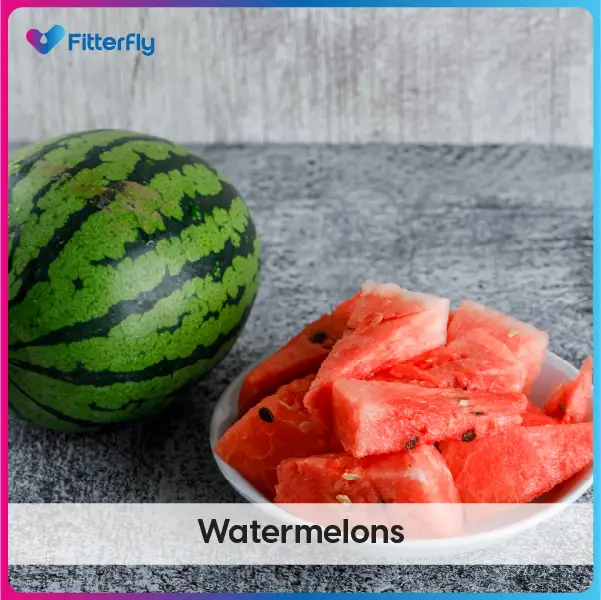

A refreshing summer delight, this fruit is hydrating, rich in iron, and low in sugar. Though watermelons have a high GI score, their overall
Glycaemic load (the total amount of food needed to cause the spike in blood sugar levels) is very low – making them a healthy option for people with diabetes. One small bowl (approximately 75-80 g) of watermelon can be consumed
8. Kiwis
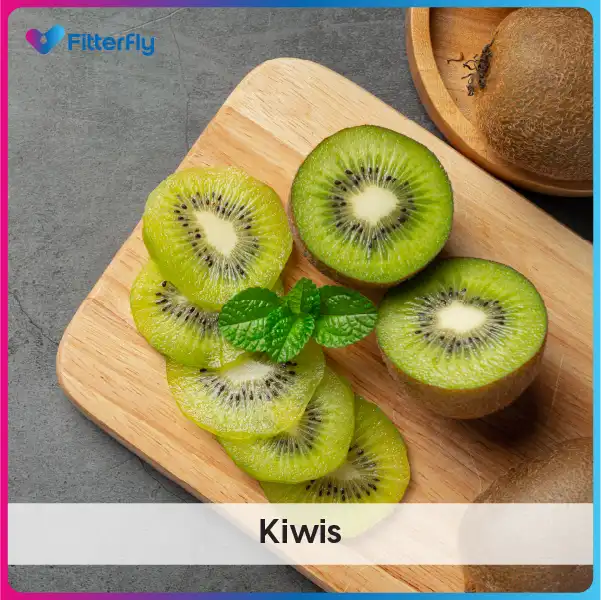

Kiwi is a low-calorie fruit packed with vitamins C and E, potassium, and dietary fiber, beneficial for both diabetes management and weight loss. The fiber helps in controlling blood sugar spikes and promotes satiety, reducing overeating. Kiwis’ antioxidant properties contribute to overall health and wellness.
9. Guava (Amrood)
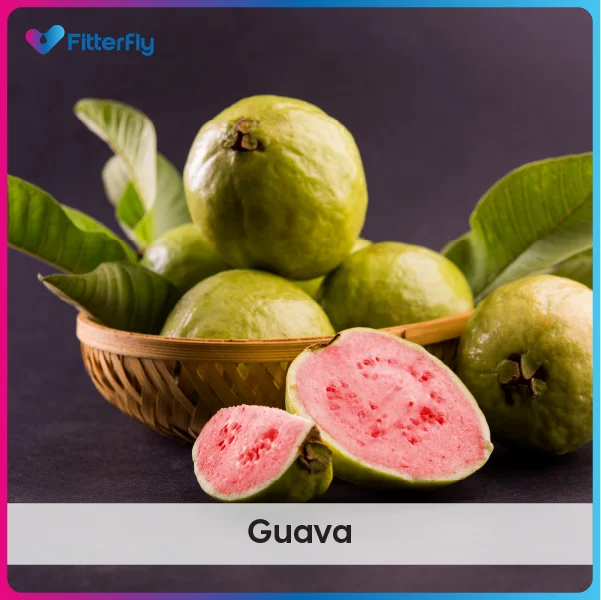

Guava is a nutrient-dense fruit low in calories but high in fiber, making it excellent for weight management and diabetes control. The high fiber content aids in regulating blood sugar levels and improves digestive health.
Guavas are also rich in Vitamin C, which boosts immunity. Their low glycemic index makes them a suitable snack for people with diabetes.
10. Papaya
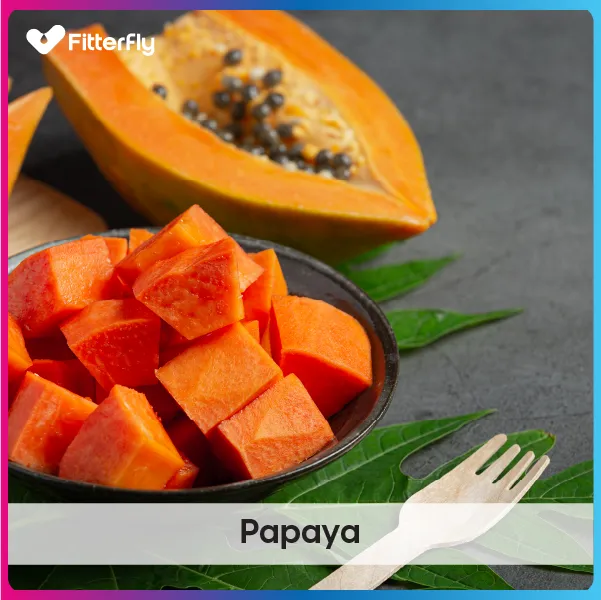

Papaya is a tropical fruit beneficial for diabetes and weight management due to its low calorie and high fiber content. It helps in regulating blood sugar levels and improves digestive health.
Papaya is also rich in antioxidants like lycopene and vitamins A and C, promoting overall health and skin wellness.
11. Plum (Aloo Bukhara)
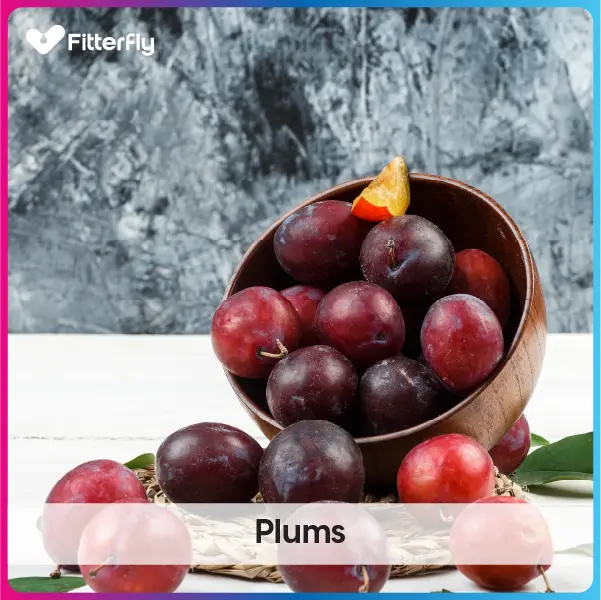

Plums are low in calories and high in fiber, making them great for weight loss and diabetes management. They have a low glycemic index, which helps in maintaining stable blood sugar levels. Plums are also rich in antioxidants, which can help in reducing inflammation and promoting overall health.
12. Peaches (Aadoo)
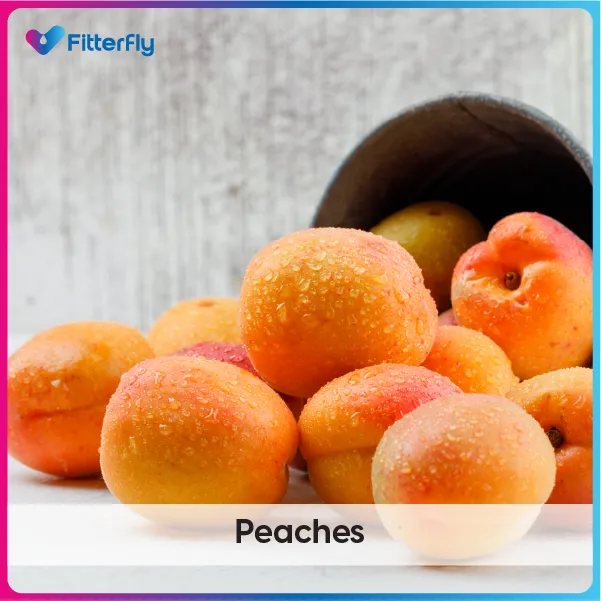

Peaches are low in calories and contain significant fiber, aiding in weight loss and blood sugar control. Their sweetness comes with a low glycemic index, making them a safe choice for people with diabetes.
Peaches also provide vitamins A and C and potassium, which support overall health and skin wellness.
13. Pineapples
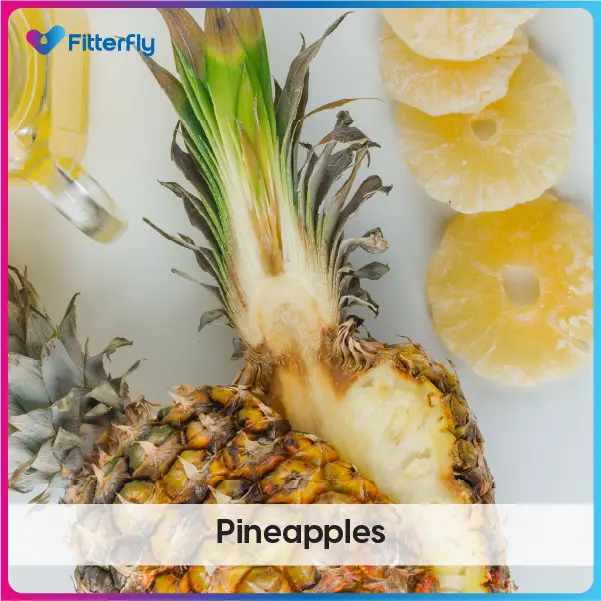

Rich in anti-viral, anti-bacterial, and anti-inflammatory properties, pineapples are also a healthy snack option for people with diabetes. The GI of pineapples can vary depending on their variety and ripening condition; usually, it ranges from 73 to 82.
14. Grapes
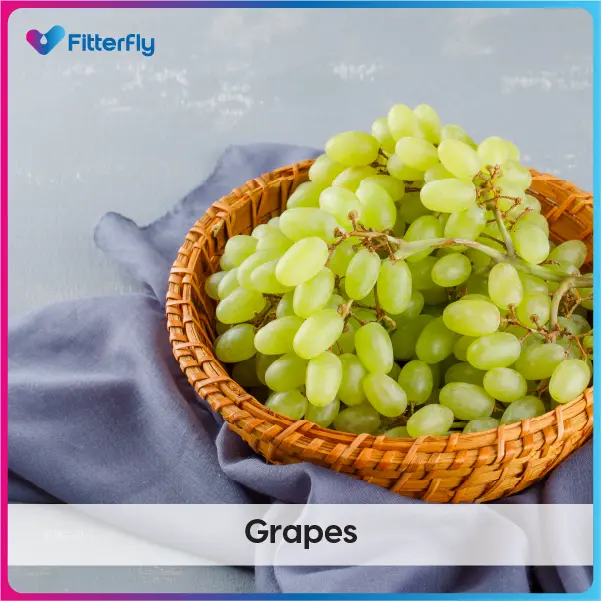

Grapes, though they have a relatively low GI, are high in natural sugars, so portion control is essential. They can be a healthy snack for people with diabetes when consumed in small quantities.
Grapes can be frozen for a refreshing snack, added to salads for a burst of sweetness, or used in moderation as part of a balanced meal.
15. Pomegranates
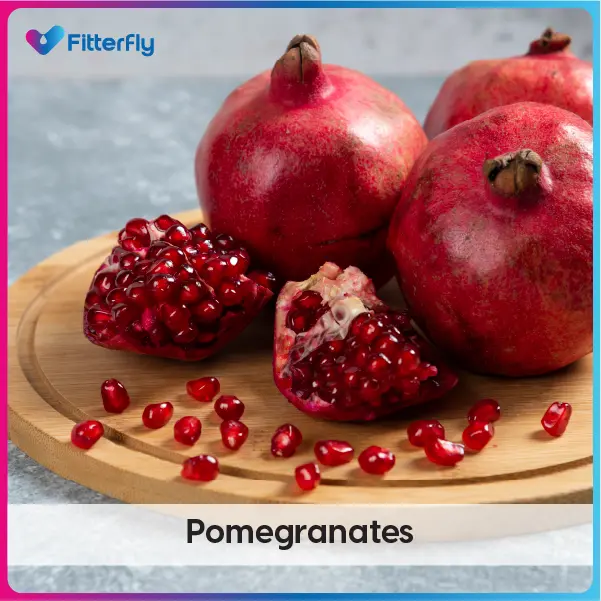

The richest antioxidant fruit of all, pomegranates are known to protect you from free radicals. Feel free to snack on a handful of these red pearls whenever they are in season.
16. Mango
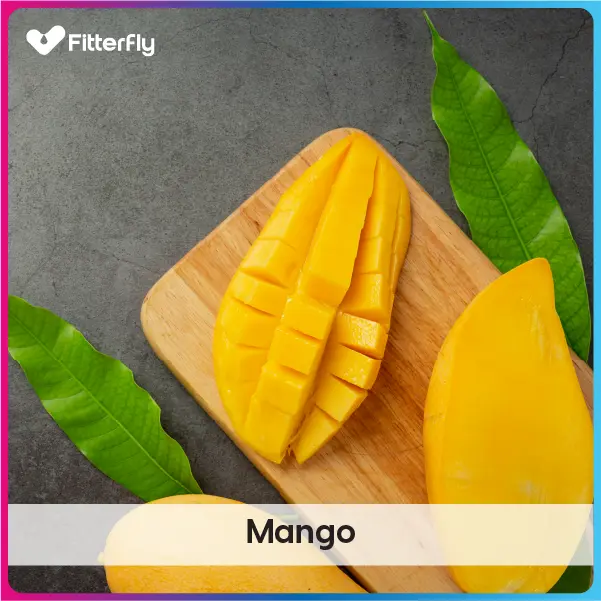

Mangoes, especially when dried and powdered, can help lower blood sugar levels in people who are overweight. They do this without causing weight gain, which is good news for people watching their sugar levels.
17. Chickoo (Sapota)
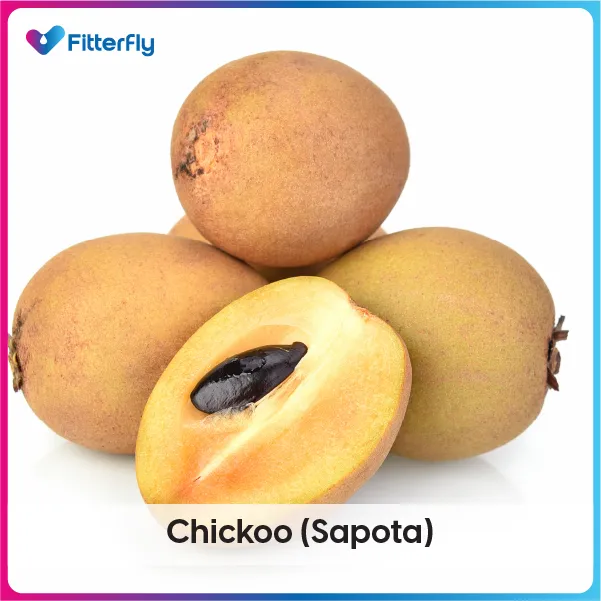

Chikoo, also known as Sapota, is a sweet, tropical fruit commonly consumed in India. While it’s rich in sugars, it’s also packed with dietary fiber, which can aid in blood sugar regulation and promote a feeling of fullness, potentially aiding in weight management.
Sapota provides vitamins like vitamin C and minerals like iron and potassium. People with diabetes should consume sapota in moderation due to its sugar content. As always, consult with healthcare professionals for personalized dietary advice.
18. Dragon Fruit
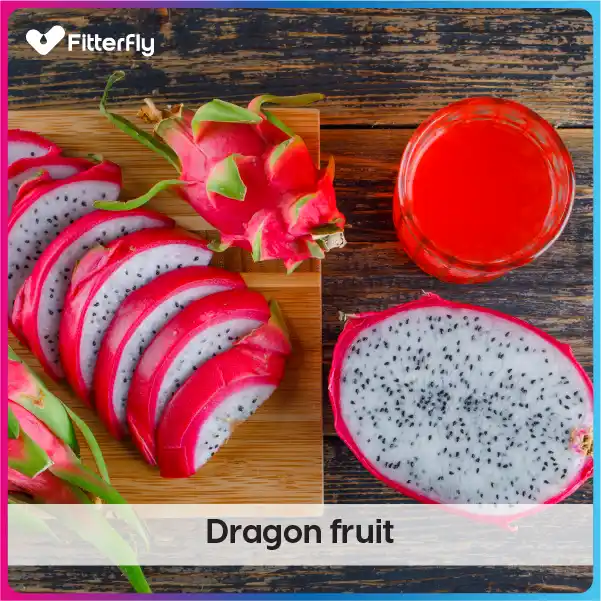

Dragon fruit, also known as pitaya, offers notable health benefits, especially for individuals managing diabetes and weight. A study suggests that dragon fruit can significantly reduce fasting plasma glucose levels in people with prediabetes.
This low-calorie fruit, rich in fiber, is also beneficial for weight management. Dragon fruit’s potential in regulating blood sugar levels makes it a promising addition to a diabetes-friendly diet.
19. Sweet Lime
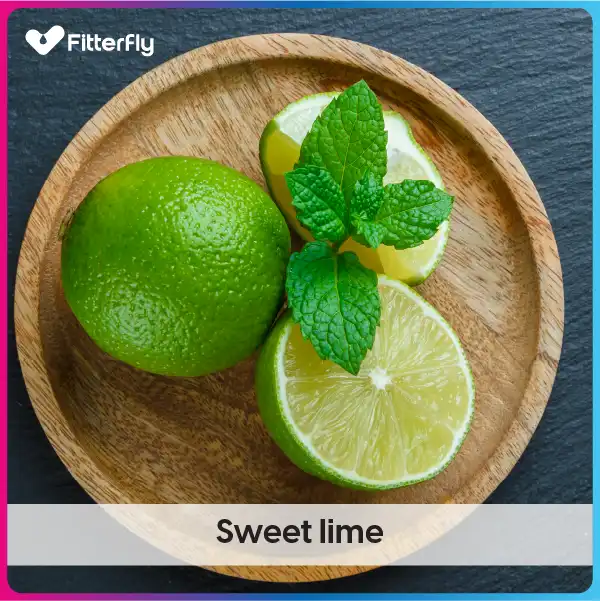

Also known as mosambi, it is popular in India and is a good choice for those with diabetes due to its low glycemic index. It’s refreshing and can be enjoyed as a juice or eaten whole.
Rich in vitamin C, sweet lime can boost immunity, but remember to consume it in moderation due to its natural sugars.
20. Pear
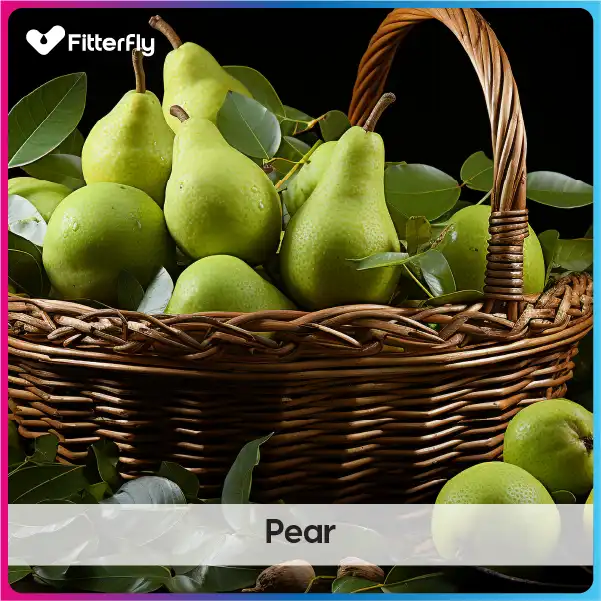

Pears are a great choice for those managing diabetes, offering dietary fiber that helps regulate blood sugar levels. Pears can be enjoyed fresh as a crunchy snack, sliced into salads, or poached with spices for a healthy dessert option.
Their low glycemic index makes them a safe and nutritious choice.
Glycemic Index of Fruits Which Are Good for Diabetes
Fruits with High GI
| Fruit | Glycemic Index (GI) | Fiber (per 100g) | Total Sugar (per 100g) | Fat (per 100g) |
| Watermelons | 80 | 0.4g | 6.2g | 0.15g |
| Pineapples | 73-86 | 1.4g | 9.85g | 0.12g |
| Papaya | 60 | 1.7g | 5.9g | 0.26g |
| Mango* | 51-55 | 1.6g | 14.8g | 0.27g |
| Sapota (Chikoo) | 73 | 5.3g | 12.53g | 1.1g |
Fruits with Moderate GI
| Fruit | Glycemic Index (GI) | Fiber (per 100g) | Total Sugar (per 100g) | Fat (per 100g) |
| Kiwis | 52 | 3g | 8.99g | 0.44g |
| Pomegranates | 53 | 4g | 13.67g | 1.17g |
| Sweet Lime | 55 | 0.4g | – | – |
Fruits with Low GI
| Fruit | Glycemic Index (GI) | Fiber (per 100g) | Total Sugar (per 100g) | Fat (per 100g) |
| Apples | 39 | 2.4g | 10.39g | 0.17g |
| Strawberries | 41 | 2g | 4.89g | 0.3g |
| Oranges | 40 | 2.4g | 9.35g | 0.2g |
| Cherries | 20 | 2.1g | 12.82g | 0.3g |
| Black Jamuns | 25 | 5.3g | 4.88g | 0.49g |
| Starfruits | 45 | 2.8g | 4g | 0.33g |
| Guava | 12 | 5.4g | 8.92g | 0.95g |
| Plums | 40 | 1.4g | 9.92g | 0.28g |
| Peaches | 28 | 1.5g | 8.39g | 0.25g |
| Grapes | 32 | 6.5g | 4.42g | 0.65g |
| Dragon fruit | 25 | 5.3g | 4.88g | 0.49g |
| Pear | 38 | 3.1g | 9.75g | 0.14g |
Note: The Glycemic Index can vary based on ripeness and other factors. The values provided are averages or typical values.
*Mangoes are typically considered moderate GI fruits, but in very ripe conditions, they can have a higher GI, which is why they are included in the high GI category here.
A word of caution: Fruits are best eaten as snacks in between meals instead of eating them with the main meals as they add to the carb count and cause your blood sugar levels to rise.
Apart from this, always remember to practice portion control and keep a check on how often you eat these fruits.
How Can You Incorporate Fruits into Your Meals Without Affecting Blood Sugar Levels?
1. Opt for Low-GI Fruits: Select fruits like Jamun (Indian blackberries), guavas, pear/nashpati, and apples. These fruits have a lower glycemic index and impact blood sugar levels less significantly.
2. Pair with Protein or Healthy Fats: Combine fruits with a source of protein or healthy fats. For example, eat an apple with a handful of almonds or have a small bowl of papaya with a spoonful of yoghurt.
3. Portion Control: Be mindful of the serving size. A small bowl of mixed fruits like Jamun, berries, and guava is better than a large serving of just one type of high-sugar fruit like banana and mango.
4. Add to Meals Thoughtfully: Incorporate fruits into your meals in a balanced way. Add diced guava to a salad or include sliced papaya in a breakfast with a protein source like nuts, yoghurt and seeds.
5. Eat one fruit a day: It is recommended to eat one fruit a day and avoid eating fruits with your main meal like breakfast, lunch or dinner. Eat fruit as a snack.
By incorporating fruits in these ways, people with diabetes can enjoy their natural sweetness and nutritional benefits while managing their blood sugar levels effectively.
To know your chances of Diabetes reversal, take the Diabetes Reversal TestDiabetes Reversal
Calculator
Incorporating Fruits into Meals and Snacks for People with Diabetes
Integrating fruits into your diet in a diabetes-friendly way can be both nutritious and delicious. Here are some ideas:
1. Fruit-Based Breakfasts
- Mixed Fruit Chaat: Combine low GI fruits like apples, guava, and papaya. Sprinkle with chaat masala for a tangy twist.
- Smoothies: Blend fruits like berries or kiwi with unsweetened curd to make a lassi.
2. Healthy Snacks
- Fruit Salads: Create a fruit salad with oranges, sweet lime, and pomegranate. Add a pinch of black salt for extra flavour.
- Frozen Fruit Treats: Freeze small pieces of watermelon or muskmelon for a refreshing snack.
3. Lunch and Dinner Additions
- Raitas: Add fruits like grated apple or pomegranate seeds to yoghurt-based raitas.
- Savoury Dishes: Incorporate small amounts of fruits like pineapple in sabzis or curries for a unique flavour.
4. Desserts and Sweet Treats
- Baked Fruits: Bake apples or pears with a hint of cinnamon and jaggery for a healthier dessert option.
- Fruit Shrikhand: Mix pureed mango or strawberry with strained yoghurt to make a fruity shrikhand.
5. Beverages
- Fruit-Infused Water: Infuse water with slices of cucumber, mint, and lemon for a refreshing drink.
- Herbal Teas: Add a slice of lemon or amla to herbal teas for a zesty flavour.
6. Creative Cooking
- Chutneys: Make chutneys with raw mango or kiwi as a tangy accompaniment to meals.
- Toppings for Chaats: Top your favourite chaats with diced fruits like papaya or apple for added sweetness and nutrition.
In your diet, fruits can be creatively included in various meals and snacks. However, portion control remains key in managing diabetes. Always consult with a healthcare provider or nutritionist for personalised advice, keeping in mind the glycemic index and overall carbohydrate content of the fruits.
REVERSED Diabetes in 3 months


5.7%
Happy members
EMI
Guarantee
4.8/5
Diabetes Prime Program
Do’s and Don’ts While Eating Fruits if You Have Diabetes
Here is a video by our in-house nutritionist expert, Shilpa Joshi, explaining the do’s and don’ts of eating fruits if you have diabetes.
FitterTake
Unlike the common presumption that all fruits are healthy and can be safely eaten by everyone, people with prediabetes and diabetes must exercise caution in doing so.
They need to eat fruits low in sugar for diabetes management and prevent the progression of the condition. People with prediabetes and diabetes must also remember to eat these fruits low in sugar in moderate amounts or as suggested by their doctor.
If you are unsure of how your blood sugar levels react to eating fruit, then monitoring blood sugar levels two hours after eating the fruit may be a good idea.
Love fruits? But worried or confused if you can have fruits if you have diabetes or prediabetes. If that’s you, then worry not; you are just at the right place.
Fitterfly understands your love for fruits, and our expert in-house nutritionists will guide you on the right way, the right type, and how much fruit you can consume. Check out our Diabetes Prime Program! or simply call us at 08068507599 to learn more.
This blog provides general information for educational and informational purposes only and shouldn't be seen as professional advice.
Frequently Asked Questions
How Does the Glycemic Index of Fruits Affect Diabetes?
The glycemic index (GI) of fruits indicates how quickly they raise blood sugar. Fruits with a high GI can cause rapid blood sugar spikes, while those with a low GI have a slower, more controlled effect, which is better for diabetes management. For instance, mangoes and bananas have a higher GI compared to fruits like jamun (blackberries) or amrud (guavas).
How Can I Incorporate Fruits into My Meals Without Affecting Blood Sugar Levels?
Choose low-GI fruits like Indian blackberries (Jamun), guavas, and apples. Pair fruits with proteins or healthy fats such as nuts or yoghurt, and consider the portion size to balance the meal. For example, adding nuts to a small serving of chopped apples can make a balanced snack.
Is Fruit Juice a Good Choice for People with Diabetes?
Fruit juice, even without added sugar, is concentrated in natural sugars and can rapidly increase blood sugar levels. It's generally better to consume whole fruits, like jamun, guava or apple, as they contain more fiber. But be mindful of the portion sizes, and consume in moderation.
How Can I Manage My Sweet Cravings with Diabetes?
Opt for fruits with natural sweetness but lower GI, such as seasonal fruits like jamun, guava, or apple. Do not forget to check your blood sugar levels after you consume any fruits.
Should I Consult a Healthcare Professional Before Making Changes to My Diet?
Yes, consulting a healthcare professional is important before making any dietary changes, especially when managing diabetes. They can provide personalised advice considering your specific health needs.
Why Are Fruits Considered Beneficial for Those with Diabetes?
Fruits offer essential vitamins, minerals, and fiber, aiding in overall health and helping to regulate blood sugar levels. For example, guavas and Jamun are rich in fiber and nutrients, making them beneficial for people with diabetes when eaten in moderation. Those fruits which are chewy (guava, apple, pears/nashpati) and are low in sweetness (oranges, sweet lime, baer, strawberry, sehtut (mulberry) should be considered. Consult with a dietitian for specific advice.





















